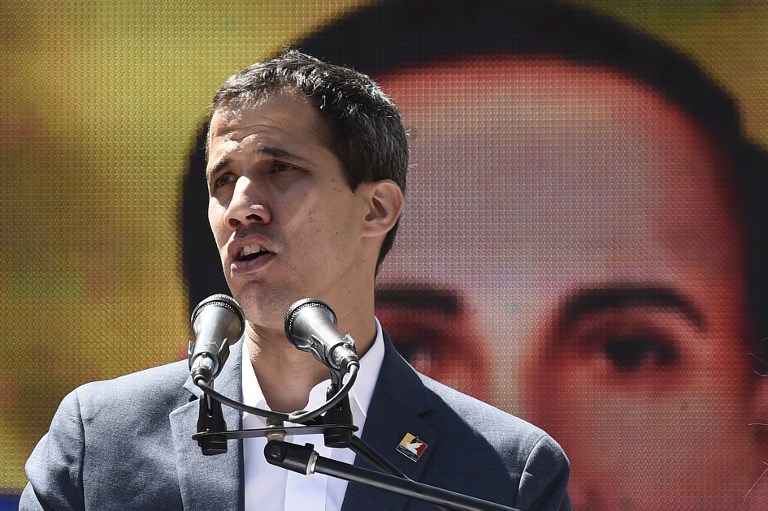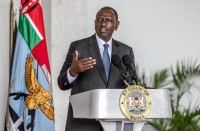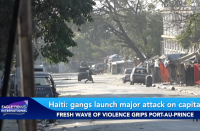
by Maria Isabel SANCHEZ
Agence France Presse
CARACAS, Venezuela (AFP) — Venezuela’s opposition leader Juan Guaido told tens of thousands of supporters on Tuesday that desperately-needed humanitarian aid would be brought into the country on February 23, despite opposition from President Nicolas Maduro.
“It’s sure that the humanitarian aid will enter Venezuela because the usurper will have no choice but to leave Venezuela,” said self-proclaimed acting president Guaido.
US aid has been piling up in Colombia at the border with crisis-hit Venezuela but until now the bridge border crossing has been barricaded by the military, under Maduro’s orders.
“We have almost 300,000 Venezuelans who will die if the aid doesn’t enter. There are almost two million at health risk,” said Guaido, recognized by 50 countries after declaring himself as Venezuela’s interim leader.
Taking his authority from the constitution, National Assembly leader Guaido views Maduro’s reelection last year in a poll widely viewed as fraudulent as illegitimate.
He is trying to force the socialist leader from power so he can set up a transitional government and hold new presidential elections.
Venezuelans have faced shortages of basic necessities such as food and medicines as the economy went into meltdown under Maduro’s leadership. Some 2.3 million Venezuelans have fled since 2015, as hyperinflation rendered salaries and savings worthless.
Maduro denies there is a humanitarian crisis and has branded the whole affair a “political show” and pretext for a US-led invasion.
Direct order
“It’s not the first time Venezuela is going to be liberated from a tyrant,” said Guaido.
“Here is a direct order to the armed forces: allow in the humanitarian aid once and for all (and) end the repression.”
The fate of tons of aid piling up in Colombian collection centers at the border with Venezuela has become central to the power struggle between Guaido and Maduro, who is backed by the powerful armed forces.
“We’re asking the military authorities to let in the aid and to protect it so that it reaches those most in need,” activist Juan Perez, 68, told AFP.
“The military are the ones keeping Maduro in power. I call on them to reflect and take the side of the people suffering from hunger,” added Maria Ballera, 75.
Guaido had called the Youth Day demonstrations across the country in part to honor 40 people killed in anti-government rallies last month.
While waiting for him to speak in eastern Caracas, his supporters chanted: “Freedom!”
Maduro meanwhile was due to speak at a march of young leftists in the center of Caracas denouncing “imperialist intervention” in Venezuela’s affairs and collecting signatures of people who reject US President Donald Trump.
250,000 volunteers
Guaido has offered amnesty to military personnel who dump Maduro and told them that refusing to allow in aid was a “crime against humanity.”
He asked the 250,000 people who signed up as volunteers to bring in the aid to organize themselves over the weekend, “because we’re going to have to go in caravans.”
The Venezuelan government distributed food and medicine on Monday when Guaido’s envoys met Brazilian officials in Brasilia and announced plans to establish a second aid storage center in the state of Roraima, on Venezuela’s southeastern border, from next week.
But Defense Minister Vladimir Padrino said the armed forces were deploying a “reinforced presence all along the border.”
Although he has wide international support in his bid to oust Maduro, Guaido needs the backing of the armed forces.
The US has presented a draft resolution to the UN Security Council calling for international aid deliveries and new presidential elections.
Russian Foreign Minister Sergei Lavrov said the move was an attempt “to destabilize the situation in Venezuela and even gain an excuse for direct military intervention.”
Speaking to AFP last week, Guaido refused to rule out asking for foreign intervention.
The Venezuelan military meanwhile announced it had started conducting exercises, set to run until Friday, to “reinforce the country’s defensive capacity.”
Maduro wants gold
Venezuela is oil dependent and sells more than 40 percent of its crude, which makes up 96 percent of its revenue, to the US, while Washington is using sanctions as an attempt to starve Maduro’s regime of its funding.
“Venezuela is in the eye of a global geopolitical hurricane,” said Maduro, who claims Trump is trying to force him out in order to take control of Venezuela’s oil reserves, the largest in the world.
In an interview with the BBC aired on Tuesday he called for Britain to return “more than 80 tons of gold” reserves deposited in London.
UN Secretary General Antonio Guterres renewed his offer on Monday to help broker talks to end the political stalemate.
Guaido has rejected negotiations with Maduro, believing he would use them to buy time.
The European Union and a group of European and Latin American ministers have called for new presidential elections, but Maduro rejected both.
© Agence France-Presse






